
Carousel is the second musical by the team of Richard Rodgers (music) and Oscar Hammerstein II. The 1945 work was adapted from Ferenc Molnár's 1909 play Liliom, transplanting its Budapest setting to the Maine coastline. The story revolves around carousel barker Billy Bigelow, whose romance with millworker Julie Jordan comes at the price of both their jobs. He participates in a robbery to provide for Julie and their unborn child; after it goes tragically wrong, he is given a chance to make things right. A secondary plot line deals with millworker Carrie Pipperidge and her romance with ambitious fisherman Enoch Snow. The show includes the well-known songs "If I Loved You", "June Is Bustin' Out All Over" and "You'll Never Walk Alone". Richard Rodgers later wrote that Carousel was his favorite of all his musicals.
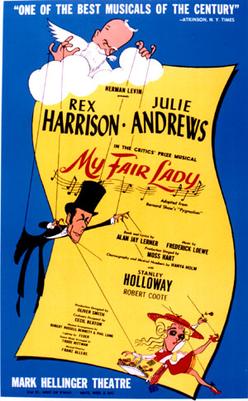
My Fair Lady is a musical with a book and lyrics by Alan Jay Lerner and music by Frederick Loewe. The story, based on the 1938 film adaptation of George Bernard Shaw's 1913 play Pygmalion, concerns Eliza Doolittle, a Cockney flower girl who takes speech lessons from professor Henry Higgins, a phonetician, so that she may pass as a lady. Despite his cynical nature and difficulty understanding women, Higgins grows attached to her.

Oscar Greeley Clendenning Hammerstein II was an American lyricist, librettist, theatrical producer, and director in musical theater for nearly 40 years. He won eight Tony Awards and two Academy Awards for Best Original Song. Many of his songs are standard repertoire for vocalists and jazz musicians. He co-wrote 850 songs.

Edna Ferber was an American novelist, short story writer and playwright. Her novels include the Pulitzer Prize-winning So Big (1924), Show Boat, Cimarron, Giant and Ice Palace (1958), which also received a film adaptation in 1960. She helped adapt her short story "Old Man Minick", published in 1922, into a play (Minick) and it was thrice adapted to film, in 1925 as the silent film Welcome Home, in 1932 as The Expert, and in 1939 as No Place to Go.

The King and I is the fifth musical by the team of Rodgers and Hammerstein. It is based on Margaret Landon's novel Anna and the King of Siam (1944), which is in turn derived from the memoirs of Anna Leonowens, governess to the children of King Mongkut of Siam in the early 1860s. The musical's plot relates the experiences of Anna, a British schoolteacher who is hired as part of the King's drive to modernize his country. The relationship between the King and Anna is marked by conflict through much of the piece, as well as by a love to which neither can admit. The musical premiered on March 29, 1951, at Broadway's St. James Theatre. It ran for nearly three years, making it the fourth-longest-running Broadway musical in history at the time, and has had many tours and revivals.
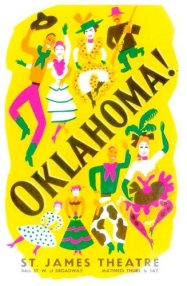
Oklahoma! is the first musical written by the duo of Rodgers and Hammerstein. The musical is based on Lynn Riggs's 1931 play, Green Grow the Lilacs. Set in farm country outside the town of Claremore, Indian Territory, in 1906, it tells the story of farm girl Laurey Williams and her courtship by two rival suitors, cowboy Curly McLain and the sinister and frightening farmhand Jud Fry. A secondary romance concerns cowboy Will Parker and his flirtatious fiancée, Ado Annie.
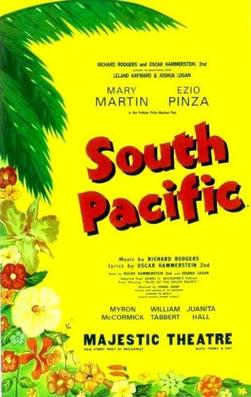
South Pacific is a musical composed by Richard Rodgers, with lyrics by Oscar Hammerstein II and book by Hammerstein and Joshua Logan. The work premiered in 1949 on Broadway and was an immediate hit, running for 1,925 performances. The plot is based on James A. Michener's Pulitzer Prize–winning 1947 book Tales of the South Pacific and combines elements of several of those stories. Rodgers and Hammerstein believed they could write a musical based on Michener's work that would be financially successful and, at the same time, send a strong progressive message on racism.

Rodgers and Hammerstein was a theater-writing team of composer Richard Rodgers (1902–1979) and lyricist-dramatist Oscar Hammerstein II (1895–1960), who together created a series of innovative and influential American musicals. Their musical theater writing partnership has been called the greatest of the 20th century.
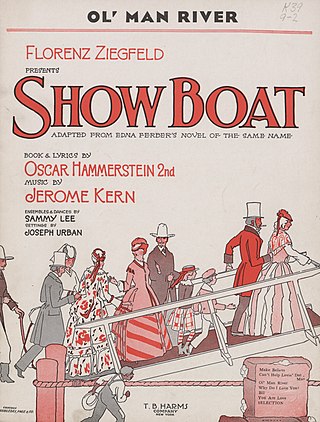
Show Boat is a musical with music by Jerome Kern and book and lyrics by Oscar Hammerstein II. It is based on Edna Ferber's best-selling 1926 novel of the same name. The musical follows the lives of the performers, stagehands and dock workers on the Cotton Blossom, a Mississippi River show boat, over 40 years from 1887 to 1927. Its themes include racial prejudice and tragic, enduring love. The musical contributed such classic songs as "Ol' Man River", "Make Believe", and "Can't Help Lovin' Dat Man".

Flower Drum Song was the eighth musical by the team of Rodgers and Hammerstein. It is based on the 1957 novel, The Flower Drum Song, by Chinese-American author C. Y. Lee. It premiered on Broadway in 1958 and was then performed in the West End and on tour. It was adapted for a 1961 musical film.
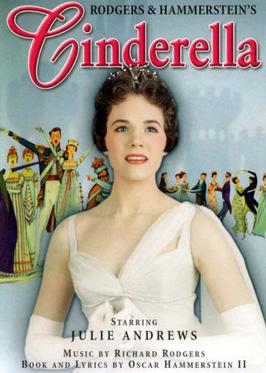
Rodgers and Hammerstein's Cinderella is a musical written for television, but later played on stage, with music by Richard Rodgers and a book and lyrics by Oscar Hammerstein II. It is based upon the fairy tale Cinderella, particularly the French version Cendrillon, ou la petite pantoufle de verre, by Charles Perrault. The story concerns a young woman forced into a life of servitude by her cruel stepmother and self-centered stepsisters, who dreams of a better life. With the help of her fairy godmother, Cinderella is transformed into a princess and finds her prince.

Saratoga Trunk is a 1945 American Western film directed by Sam Wood and starring Gary Cooper, Ingrid Bergman, and Flora Robson. Written by Casey Robinson, based on the 1941 novel Saratoga Trunk by Edna Ferber, the film is about a Texas gambler and the daughter of a Creole aristocrat and his beautiful mistress. They become lovers and work together to seek justice from a society that has ruined their parents and rejected them. The title of the film and novel has a dual meaning. Clio says at one point that she thought a Saratoga trunk had to do with luggage, not a railroad line. It meant both. Saratoga trunks were top of the line for elegant travelers.
"The Sound of Music" is the title song from the musical of the same name that premiered in 1959. It was composed by Richard Rodgers with lyrics written by Oscar Hammerstein II. The song introduces the character of Maria, a young novice in an Austrian abbey.

Pipe Dream is the seventh musical by the team of Richard Rodgers and Oscar Hammerstein II; it premiered on Broadway on November 30, 1955. The work is based on John Steinbeck's novel Sweet Thursday—Steinbeck wrote the novel, a sequel to Cannery Row, in the hope of having it adapted into a musical. Set in Monterey, California, the musical tells the story of the romance between Doc, a marine biologist, and Suzy, who in the novel is a prostitute; her profession is only alluded to in the stage work. Pipe Dream was not an outright flop but was a financial disaster for Rodgers and Hammerstein.

Pal Joey is a 1940 musical with a book by John O'Hara and music and lyrics by Richard Rodgers and Lorenz Hart. The musical is based on a character and situations O'Hara created in a series of short stories published in The New Yorker, which he later published in novel form. The title character, Joey Evans, is a manipulative small-time nightclub performer whose ambitions lead him into an affair with the wealthy, middle-aged and married Vera Simpson. It includes two songs that have become standards: "I Could Write a Book" and "Bewitched, Bothered and Bewildered".

Victoria is a principal character in the 1981 musical Cats, written by Andrew Lloyd Webber based on T. S. Eliot's 1939 Old Possum's Book of Practical Cats. Primarily a dance role with no solo singing parts, the role demands extensive ballet training and a high degree of flexibility. The character is featured in a ballet solo as well as a pas de deux in the musical, and leads most of the ensemble dance routines.
Julie Dozier is a character in Edna Ferber's 1926 novel Show Boat. In the Jerome Kern and Oscar Hammerstein II's classic musical version of it, which opened on Broadway on December 27, 1927, her stage name is Julie La Verne. She is exposed as Julie Dozier in Act I. In Act II, Julie has changed her name, this time to Julie Wendel.

Show Boat is a 1926 novel by American author and dramatist Edna Ferber. It chronicles the lives of three generations of performers on the Cotton Blossom, a floating theater on a steamboat that travels between small towns along the banks of the Mississippi River, from the 1880s to the 1920s. The story moves from the Reconstruction Era riverboat to Gilded Age Chicago to Roaring Twenties New York, and finally returns to the Mississippi River.
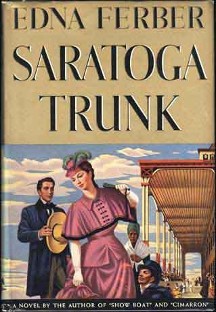
Saratoga Trunk is a best-selling novel by American author Edna Ferber, originally published by Doubleday, Doran in 1941.

Rodgers & Hammerstein's Cinderella is a 1997 American musical fantasy television film produced by Walt Disney Television, directed by Robert Iscove, and written by Robert L. Freedman. Based on the French fairy tale of the same name by Charles Perrault, the film is the second remake and third version of Rodgers and Hammerstein's musical, which originally aired on television in 1957. Adapted from Oscar Hammerstein II's book, Freedman modernized the script to appeal to more contemporary audiences by updating its themes, particularly re-writing its main character into a stronger heroine. Co-produced by Whitney Houston, who also appears as Cinderella's Fairy Godmother, the film stars Brandy in the title role and features a racially diverse ensemble cast consisting of Jason Alexander, Whoopi Goldberg, Bernadette Peters, Veanne Cox, Natalie Desselle, Victor Garber, and Paolo Montalban.



















